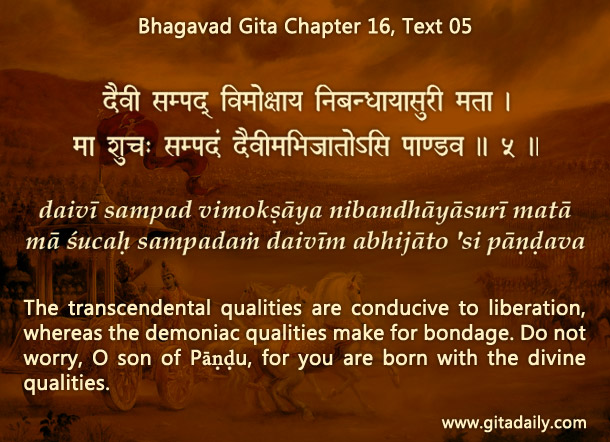
Are right and wrong absolute categories: “This is right and that is wrong”? Or are they context-dependent?
To understand the answer, let’s consider the Gita’s treatment of violence. Its setting – a battlefield talk to bolster the sagging morale of a confused warrior – seems to recommend violence. Yet it (16.02) praises nonviolence as a morally commendable virtue, a characteristic of the godly nature. Two verses later (16.04), it states that anger and harshness, two usual companions of violence, characterize the ungodly nature. Understandably, this characterization troubles Arjuna. The erudite Gita commentator Baladeva Vidyabhushana explains that Arjuna feels apprehensive about fighting: “Will I be acting according to my ungodly nature?” To remove this fear, the next verse (16.05) assures Arjuna that his nature is godly.
How can the godly be both nonviolent and violent?
It depends on the context – the role that the godly are playing in society.
This becomes clear when the Gita outlines the qualities of different members of society. It declares (18.43) that a characteristic of kshatriyas is resilience in war – the opposite of nonviolence. Virtuous rulers who have the responsibility to maintain moral and spiritual order in society can’t chicken out or be naively pacifistic when dealing with violent miscreants. In contrast, the previous verse (18.42) states that a characteristic of brahmanas, spiritual intellectuals who serve society primarily as teachers, is kshantir, a word that conveys patience, tolerance and forgiveness – all typical of nonviolence.
By commending violence for rulers and nonviolence for teachers, the Gita defines morality in contextual terms. By refusing to pigeonhole morality in rigid stereotypes, it demonstrates an acute awareness that life’s situations can be too subtle, complex and unpredictable to fit into inflexible moral categories.
Accordingly, it provides a broad philosophical framework founded on the principle of selfless service that acts as a pragmatic guide for sound decision-making.


Leave A Comment